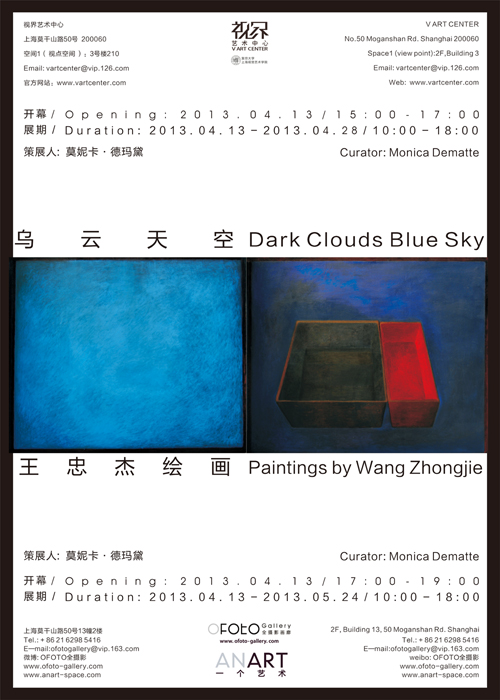- DARK CLOUDS BLUE SKY
- Artist: Wang Zhongjie
- Critic: Curator: Monica Dematté
- Opening: 2013.04.13 / 17:00 - 19:00
- Duration: 2013.04.13 - 2013.05.24 / 10:00 - 18:00
- Address: ANART. 2F, Bldg.13, 50 Moganshan Rd., Shanghai, China

Dark Clouds Blue Sky
Wang Zhongjie’s paintings
When I first set foot in Wang Zhongjie's studio, I was left almost breathless. I felt an energy that bespoke a truth and depth whose rareness always strikes me and fills me with joy. I sensed the rhythm of life resounding in those canvases. He stood nearby barraging me with an outpour of words spoken in a barely intelligible dialect, but I thought I understood everything nonetheless. ;
We never talked about color and composition, materials or art theories. The word “Art” is rarely mentioned in his diary and just as rarely in his conversations. The communicative urgency that pervades him regards his very existence itself. Zhongjie urgently wishes to “understand” something about his reason for living so as not to waste other precious years of his life, and so as to convey it to his son, thus sparing him the many ineffective, futile posturings riddling the theater of our daily lives. Perhaps Zhongjie doesn't know that time is never enough, that right when we're about to reach a “higher understanding,” someone or something clouds our minds or stops our hearts. Thus the human race is doomed to reiterate the same mistakes and illusions because that is what differentiates it and distances it from the gods.
Wang Zhongjie isn't a painter, he's a man who's wholeheartedly seeking the reason for, and meaning, of his life, and he's doing so through what he knows how to do best: painting. Zhongjie did not study at an Academy of Fine Arts, he didn't take part in any of those activities or associations that “those within his field” normally take part in. He has no need to free himself of the stylistic formulas art institutes impart; his hand is free to act upon the canvas governed solely by his mind, which is (relatively speaking) original and unique and whose expression is not hampered by excessive external influences. Yet his rapport with the canvas isn't easy or immediate. It's as if, when faced with an untainted surface, he were face-to-face with the mystery of life itself. The search for an expressive “key,” which he often talks about, does not refer to technical or painterly questions, but to existential ones. That's why each day, as he returns home from his studio, or before going to bed, he asks himself the question: How close have I come to solving that mystery? How much more have I learned about it?
Through the years I've seen his work evolve from a painterly language that is quite complex and original, made up of singular, evocative colors, to compositions that are almost geometric, imbued with a metaphysical, dreamy atmosphere that is still inhabited by a few “terrestrial” creatures (roosters, monkeys, human figures, horses...), all part of a process that has gradually achieved a greater formal simplicity, up to his current works, in which the colors have been relegated to the outer reaches of the canvas, thus framing an empty space. It is this very space, perhaps because it appears empty, which constitutes an extremely rich monochromatic surface that is the fruit of several superimposed layers of color emanating an inner light of their own and rendering it strangely and magically luminous. I was left with the feeling that those images that were so crowded with the symbols that permeated his paintings a few years ago, have been pared down, filtered and reduced to pure color, to the juxtaposition of certain hues in those few centimeters that, in the last two years, have framed every painting. It is as if life itself were slowly purifying itself from any aspect the author considers to be superfluous and from every inessential detail. I didn't find this development to be strange or surprising because I sensed that Zhongjie's quest went well beyond questions relating to “painterly” results. What the artist yearns for, as he wrote in a 2008 diary entry, is “something immutable,” it is “to reveal the core” and, in order to do so, he's decided to divest himself of “descriptions of stories, circumstances, feelings...”.
Zhongjie has a visceral, unutterable, indescribable sensibility that drives him in both his life and paintings. His canvases are the strenuously reached, distilled expressions of his intuitions, the painstaking excretions of that sensitive and prolific sensibility. He understands and engages in painting – art - not as an end in itself (on the contrary, he doesn't at all consider it in these terms), but as a key to understanding the essence of existence. It's clear that Zhongjie includes art within the realm of the spirit rather than that of matter, and in this sense all considerations that are not based on purely spiritual questions have no right to be applied.
One writes (paints) to populate the desert, to be alone no longer within the voluptuous [confines] of being alone,
to distract oneself from the temptation of nothingness, or at least procrastinate it.
Gesualdo Bufalino
Monica Dematté
Vigolo Vattaro, 18 January 2012


